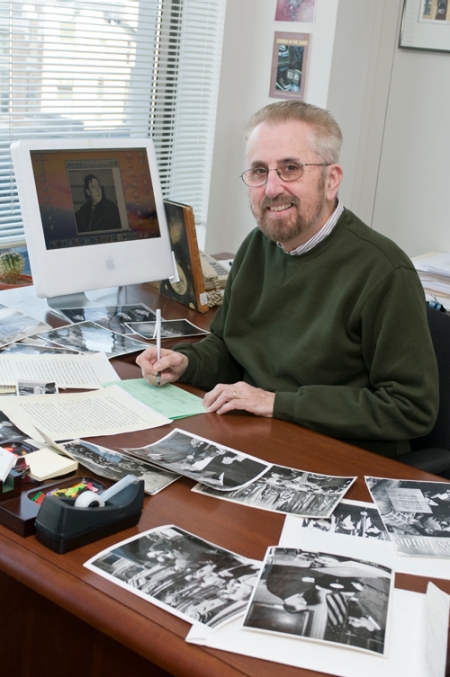
By
After years of writing more than 20 academic and professional-related articles and books on electronic media, Adjunct Associate Professor of Communication Michael Keith has turned to fiction, earning nominations for the PEN/O. Henry Award and Pushcart Prize. Keith spoke with Sean Smith of the Chronicle about this new, and successful, direction in his career.
Let's put your fiction writing in some context: In addition to publishing books about, for instance, counter-culture radio in the 1960s, the use of broadcast media by Native-Americans, gays and lesbians, and the right wing, you also wrote the most widely adopted text on radio in the country and globally, The Radio Station. Had you ever envisioned yourself as a fiction writer?
I always wanted to write fiction but necessity and practicality dictated I do otherwise. For over 30 years, my writing has concentrated on non-fiction, scholarly topics, and that has certainly offered its own rewards, but I think I was sublimating my urge to write fiction. In many cases, when I look back at my academic monographs I see I was really storytelling, albeit employing traditional research methods and conceits. All of my non-fiction titles stem from a curiosity about a given topic, and in that respect its origin is similar to fiction. An idea strikes you, whether fanciful or pragmatic, and you pursue it within the prescribed framework. In the end, all writing has a creative component.
It's also important to mention your 2003 memoir, The Next Better Place, about your cross-country travels as a child with your father. Did writing that book point you in the direction of fiction?
I think my memoir helped whet my appetite for creative writing. Although a memoir is fact-based, it is a combination of memory and imagination, so you have more latitude with it than you do with pure scholarship. With the latter you have to abide by established rules and conform to conventional criteria. Not so with a personal account. One form of writing requires objectivity while the other relies on subjectivity. Of course, biography and autobiography share a lot in common with scholarly writing.
So, at some point, did you just say to yourself, "I'm going to try writing fiction"?
Surprisingly, just three years ago. I woke up thinking of my recently deceased mother, and from it came my first short story, "The Everlasting Sorrow of Silence." That story seemed to open the floodgates. Eighty stories later, I feel like I'm just getting started.
Other than obvious differences in subject matter, what kind of adjustments did you find yourself making in being a writer of fiction as opposed to the non-fiction/academic work?
Not a lot. Both require dedication and discipline. Both put you at the keyboard — you have to sit down and do it. And like academic writing, I often have to research my fiction topics.
When your fiction earned a couple of award nominations, was that when you realized, "Hey, I can really do this," or did that moment come earlier?
I still doubt whether I can do it, even after seeing my fiction in dozens of on-line journals and in several books. I have an idealized vision of what a "creative" writer is, and I doubt I'll ever fulfill that ideal, but it keeps me striving.
Have you been able to use any of your fictional writing as part of your teaching?
Hoag's Object, my second story collection, contains around a dozen tales that explore the often pejorative relationship between individuals and media, so I use it as a secondary text in a couple of my courses. Students seem to like the diversion that speculative fiction provides in the study of a subject. It offers another way of seeing things and often enhances understand and meaning.
For more information about Michael Keith’s non-fiction and fiction writing, check out his website.



